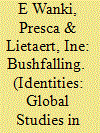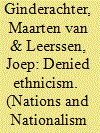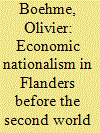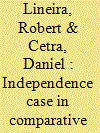|
|
|
Sort Order |
|
|
|
Items / Page
|
|
|
|
|
|
|
| Srl | Item |
| 1 |
ID:
169048


|
|
|
|
|
| Summary/Abstract |
Educational mobility in Cameroon is not a recent phenomenon, yet through the notion of ‘bushfalling’ – that is, the way international migration is envisioned and constructed in Cameroon – young Cameroonians explore routes to new destination countries for educational migration as a way of fulfilling their dreams of a better future. These dreams are enabled and challenged by the different role identities the students have to combine in the destination country. This article focuses on self-sponsored Anglophone Cameroonian students in Flanders, who combine roles as students, workers and transnational caregivers. Using bushfalling as our analytical lens, we explore the change in understanding bushfalling through the educational route and its implications for transnational family relations. Further, we explore the various ways in which these students negotiate and manipulate the different roles, yet keep the student role identity in the centre, and how this in turn informs their next step in the education-migration trajectory.
|
|
|
|
|
|
|
|
|
|
|
|
|
|
|
|
| 2 |
ID:
111861


|
|
|
|
|
| Publication |
2012.
|
| Summary/Abstract |
The Walloon movement is the lesser-known counterpart to the Flemish movement in Belgium. In contemporary political debate it presents itself, and is usually perceived, as a civic and voluntaristic movement predicated on the values of democracy, freedom, openness and anti-nationalism. As such it is contrasted against its Flemish counterpart, which accordingly is characterised as tending towards an ethnic exclusivist form of nationalism hinging on descent, culture and language. However, the historical record behind these representations shows that the Walloon movement is rooted in ethno-cultural as much as social politics, and that it has always contained both civic and ethnic elements to varying degrees. This article highlights the Walloon movement in order to analyse the language and national stereotypes in which national movements are characterised both in political rhetoric and in scholarly analysis. The case is particularly relevant for the problematic usage of the 'civic-ethnic' opposition, slipping between the discourses of antagonism and analysis; one type of such slippage is here identified as 'denied ethnicism'.
|
|
|
|
|
|
|
|
|
|
|
|
|
|
|
|
| 3 |
ID:
082682


|
|
|
|
|
| Publication |
2008.
|
| Summary/Abstract |
In this article the author makes the claim that economic nationalist ideas had their origins in the Flemish Movement before the First World War and were further developed in the interwar period. This is an important modification of the classical view that Flemish nationalism before the Second World War was mainly focused on the linguistic and cultural situation in Belgium. Central to this contribution is the view of economic nationalism as an ideology using social and economic means for nationalistic purposes, although there are variations in the degree to which economy and nationalism are tools or purpose. In any case there was not much consistency, because there were different views on what constituted the interests of the 'Flemish nation', and which social and economic principles should be adopted. In addition, a movement that did not show much unity could not construct a homogeneous social-economic agenda
|
|
|
|
|
|
|
|
|
|
|
|
|
|
|
|
| 4 |
ID:
150915


|
|
|
|
|
| Summary/Abstract |
Community-based renewable energy initiatives may be important actors in the transition toward low-carbon energy systems. In turn, stimulating investments in renewable energy production at the community level requires a better understanding of investors' motives. This paper aims to study the heterogeneity of motivations that drive individuals to participate in community renewable energy projects and the underlying explanatory factors behind this, as well as the implications for their level of engagement in initiatives. Based on quantitative data from an original survey conducted with two renewable energy cooperatives in Flanders, the statistical analysis shows that cooperative members should not be considered as one homogeneous group. Several categories of members with different motives and levels of engagement can be distinguished. This heterogeneity is explained by contrasts in terms of institutional settings, spatial patterns and attitudes to the diffusion of institutional innovations. Regarding policy implications, the findings suggest that this heterogeneity should be taken into account in designing more effective supporting policies to stimulate investments at the community level. The activation of social norms is also shown to be a promising mechanism for triggering investment decisions, although the implications of its interplay with economic incentives should be further explored.
|
|
|
|
|
|
|
|
|
|
|
|
|
|
|
|
| 5 |
ID:
138883


|
|
|
|
|
| Summary/Abstract |
Scotland is not the only sub-state unit in Europe where relevant political actors make claims for independence. To generate insights on these independence demands, we compare the drivers, arguments and popular support for secession in Scotland, the Basque Country, Catalonia and Flanders. We argue that national identity, party politics and the economy are behind the independence requests, and the exact articulation of these elements varies from case to case. Currently, the most salient of these demands are the ones from Catalonia; Basque demands for self-determination are less prominent than in the past, whereas the demand for a vote on independence is much less articulated in Flanders. Although the Scottish independence referendum has set a precedent for solving independence disputes, we argue that the possibilities of exporting the Scottish referendum experience to other realities are limited.
|
|
|
|
|
|
|
|
|
|
|
|
|
|
|
|
|
|
|
|
|